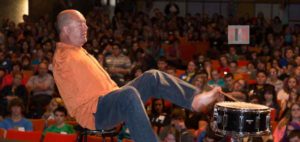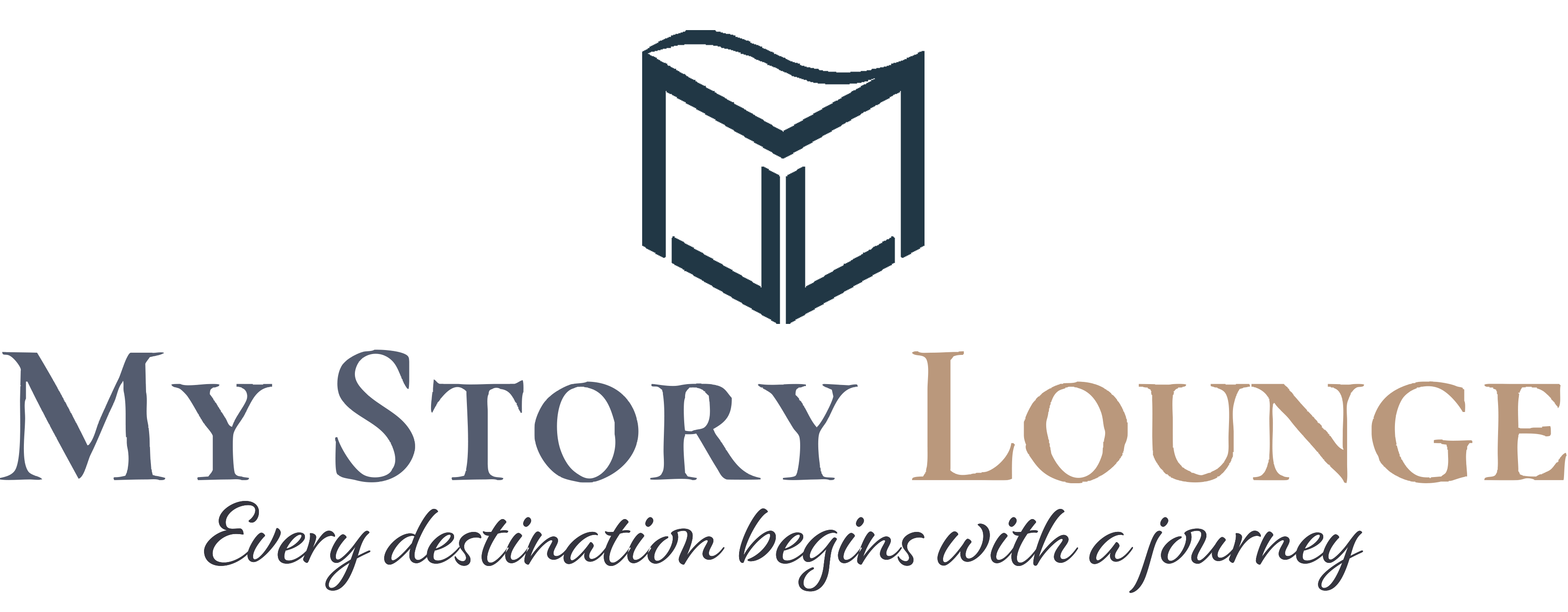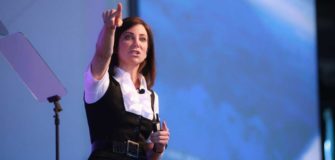Best Thing That Happened: Bad Circumstances – Alvin Law
Share
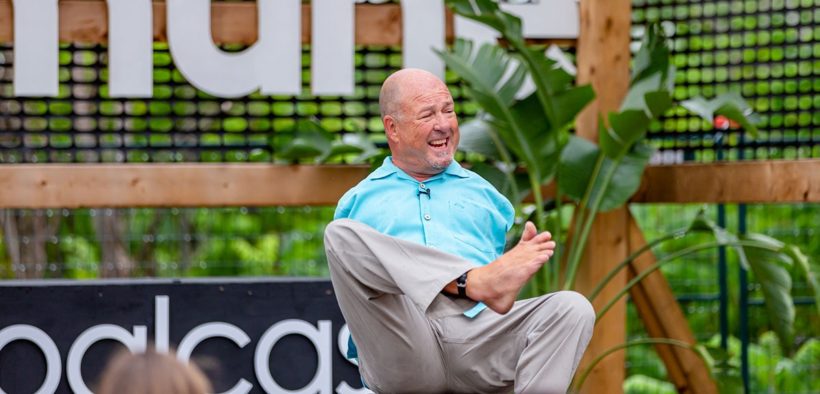
“The best thing that ever happened to me is being born without arms. It brought me circumstances I never thought possible.”
In the early 1960’s, over 13,000 babies around the world were born with deformities as a direct result of Thalidomide – a drug prescribed to relieve morning sickness. Alvin Law was one of them. In his case, just a couple of the tiny pills were enough to cause him to be born without arms.
Facing what they thought was a hopeless situation, Alvin’s birth family courageously gave him up for adoption. They hoped and prayed that their sickly, deformed newborn would somehow find a family more capable of caring for his needs. Luckily, their prayers were answered. Hilda Law was a fifty-five year old foster mother who, along with her husband, Jack, took in Alvin, nursed him back to health and have stood as his pillar of support ever since.
If you ever saw Alvin in person, one of your first reactions might be to feel a sense of pity. But don’t be fooled by his appearance. As an international speaker and bestselling author, Alvin not only travels the world to speak to crowds of captivated audiences, he has worked with over 7,500 organizations on five continents for corporate training purposes. Such companies include Merck & Company, ConocoPhillips, Kosmos Energy, Caribbean Association of Banks, Alberta Energy Regulators and GolfTec, just to name a handful.
In addition, he has appeared on over a hundred telethons and media features, and was the subject of two award winning television documentaries. Alvin was also featured on The Joan Rivers Show, CBS’s How’d They Do That, CBC’s What On Earth and ABC’s Frontrunners. To top it all off, he has played a direct role in raising over USD 225 million dollars for charity to date.
Alvin shares his life with his wife and business partner, Darlene, and Murphy, a rescue dog, in beautiful Calgary, Alberta, Canada. We caught up with him to hear more about his inspiring story, admire his positive attitude and find out how he has overcome major obstacles in his life with complete optimism.
EARLY LIFE
Tell us more about what it is like growing up with your foster parents – how did they contribute to your life and shape your perspectives?
I believe that my experience of being abandoned at five days of age by my birth parents and then a few weeks later, being placed in a foster home illustrates the power of “Nature vs Nurture”! I have no ill will towards my birth family at all. In fact, I’ve always been amazed that anyone would even want a baby like me. I’m not overly “religious” but am highly “spiritual”, convinced that this was the essence of fate.
My foster parents, “Mom & Dad”, were somewhat religious – so having a foster home was akin to doing mission work. But our home life wasn’t about bible reading or constant religious discussion. My mom’s biological children aka my brothers, John and Terry, had already left home to start their own families and lives by the time I was adopted. Mom & Dad were in their fifties when they adopted me so they had the experience and wisdom to deal with an armless child like me.
This was 1960 and deformed people like me were seen by many as freaks and outcasts, not human beings. I grew up in a community of around 10,000 people. It was a rural area where farming was the main economy.
Contrary to what people might think, I didn’t spend my childhood hidden in our home at all. In fact, I went everywhere and soon became “The Law Boy”! Furthermore, I was not only accepted, but embraced by people in the community. But I did not live an entitled life where people helped me with everything – a lot of self-reliance was emphasised during my childhood.
Describe to us the daily challenges you encountered while growing up and how you overcame them.
I had a spectacular childhood. I knew most of the other kids in my neighbourhood because we grew up together. I wasn’t excluded at all until adolescence but that wasn’t about having no arms. It was about different interests then but my early youth was also about the era for another reason. We were “free range children”! We didn’t have our parents hovering over us, not even mine.
The biggest challenges of my early years came with some irony. I was seen as a ‘medical curiosity’, so I went to countless clinics so doctors and rehabilitation experts could examine me. What really sticks out for me was the language they used. It was like I was a mistake and they needed to fix me!
Another bigger issue was my education. In 1966, handicapped children were relegated to special schools, not like the social integration we see today. My parents knew that I needed a real education as they believed that my intelligence would make up for my lack of arms. After many hurdles, I was allowed to go through a regular education. I even graduated from high school with honours!
How would you sum up your childhood?
My childhood is easy to sum up…the best!
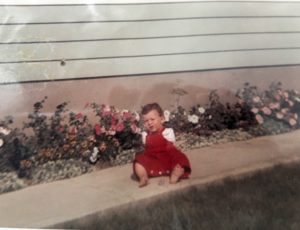
JOURNEY
Could you share with us the moments/encounters when you first discovered your musical talents? And how did your music career flourished from there?
I lived in a home where we practiced Christianity and went to church every Sunday, that was where I started to love singing. I was also put in tap dancing classes where I learned to dance.
Although we didn’t have a piano at home, my mom took me to see a lady who gave piano lessons and while she admired my “courage”, she simply believed my toes were too short to play piano properly – it made me lose interest. But this was not the end of my music journey.
The next year, I was invited to join the school band! At first the new band director was hesitant and was unsure that I could handle the trombone, let alone play with an entire band. But eventually they came up with a solution – they mounted the trombone on the side of a wooden chair with metal rods and clamps. I used the slide with my right foot. It worked. So in 1978, I was chosen to play First Chair Trombone in Canada’s National All Star High School Jazz Band!
As a teenager, I got to go to Summer Band Camp for Jazz and that’s when I learned to play a drum set (Which I still do). After going to college, I taught myself to play the piano too! But the real highlight of it all, was the people I played music with. I have an expression I created for this: “Musicians don’t care what you look like. All they care about is, can you play? The answer…Yes I Can”!
Why did you choose to become a professional speaker?
I had no plans to become a professional speaker. But in 1976, I was asked to be an “Ambassador” for handicapped children in my home province of Saskatchewan, Canada. I started out speaking at several charity events and then at telethons to talk about how it was like to live without arms.
Back then I couldn’t see much of a financially stable future doing talks on stage. Thus I went to college to study Broadcasting. Upon graduating in 1980, I got a job as a disc jockey at an FM radio station in Regina, Saskatchewan, Canada. Soon I became very popular and well known.
It was an opportune time, because the United Nations (UN) declared in 1981, The International Year of Disabled Persons. Being invited to be a guest speaker at such UN events saw my popularity rise overnight!
It didn’t take me long to realize that not only could I get paid to be a speaker, but it was really my true destiny. All the learning I did to be a broadcaster gave me the right skillset to be a speaker. And if I may humbly mention, I do have a remarkable story to tell about myself! I am proud to say that I still speak on stage today, just as I did forty years back!
What were some important lessons or things you have learnt along the way?
I am a “student of life” and an observer of people, or another way to put it – I’ve been privileged to be enlightened this way.
I didn’t realize it but I had been living a cliche. I have been “living outside the box” my whole life and constantly asked my audiences to do the same. I’d accepted my role as an advocate for people with special needs, so I had to embrace the whole notion of diversity and inclusion – action speaks louder than words.
I’ve seen the world move from so many taboos – mixed race relationships, gay marriage, LGBTQ+ and racial segregation…we’ve come so far. It’s true that “character” can’t be purchased, self esteem doesn’t start by looking in a mirror and resilience can’t exist in a bump free life. More importantly, I’ve learned that love is blind and we only get one life – so we need to make the best of it.
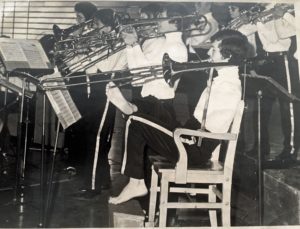
ACHIEVEMENTS
Which achievements are you most proud of and why?
In music
I vividly recall my first “achievement” – I got to tap dance with my troupe on local television in 1970. Then, I won my first solo competition on trombone at a local music festival and in 1978, I was chosen Lead Chair Trombone for Canada’s All Star High School Jazz band.
In 1977, I and two other Canadians represented our country at an International Red Cross Youth Camp in Norway.
I won a few other music awards too such as – ‘Saskatchewan Junior Citizen of the Year’ in 1978, ‘Canadian Junior Citizen of the Year’ in 1982 and I was named the first ever ‘Mount Royal College Most Distinguished Alumni’ in 1983.
In 2016, I got to play drums for an awesome promotional video for the Rio Paralympics, “The Real Superhumans”! The highlight? We recorded the soundtrack at the famous Abbey Road Studios in London.
In speaking
In 2009, I received my Certified Speaking Professional (CSP) designation, an honour where less than 10% of all professional speakers in the entire world are able to attain.
In 2013, I was inducted into the Canadian Professional Speakers Hall of Fame. In 2018, I was also inducted into the Canadian Disability Hall as well.
In acting
In 1996, I played a character on the hit television series, “X-Files”.
In relationship
To top it all off, one of my biggest achievements was meeting my wife and business partner, Darlene in 1991. I convinced her to marry me two years later…that’s a huge achievement!
How do you usually connect with your audience as a speaker?
It’s difficult to pick one thing that I do to connect with my audience. But I could share my experience connecting with kids as a speaker.
Back in 1981, after I quit my radio job to become a speaker, I was going to schools to give talks where 90% of the time, my audience were children. And if you know kids well enough, they are very observant and curious – they can spot a phoney person from a mile away.
During that time, I used a technique to coincide with the topic I was speaking about, on ‘Disability awareness’. Walking onto a stage or gymnasium floor with 500 kids’ eyes on you can be intimidating. But remember that I was also a musician.
So I would walk out and ask the students and teachers to close their eyes and not look at me for 30 seconds while I played a single snare drum. After 20 seconds or so, I’d tell them they could open their eyes to watch while I played a bit more. Then I helped them to realise that when they closed their eyes, they most probably didn’t think of a disabled person producing those sounds on the drums. In essence, the perception of a handicap person in front of them is simply a visual illusion! It’s always about the attitude and mindset rather than the physical circumstances of someone. It worked, they understood what I meant immediately.
While my unusual body form naturally attracts people’s attention, my wife Darlene also believes that my greatest strength is my voice. I am a trained broadcaster and have a very resonant voice that commands attention without being aggressive. Over the years, I’ve learned stagecraft, pacing and inducing humour in my content. Sharing funny stories does two things – 1) It engages my audience and 2) It makes me ‘human’ enough to connect with them.
What do you think are the key ingredients to your success?
The key to my success is mostly a mystery to me. The answer is more boring than anyone would expect but very profound as well.
It all comes down to having a support system (In this case my wife), turning my passion for speaking into a business, spending a great deal of time and money on professional development and getting access to as many international speaking gigs as possible.
Philosophically, I’ve lived my words, tried to remain humble but most importantly, I remained authentic by focusing on just being a good person.
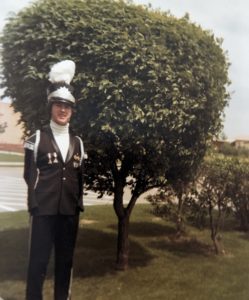
PERSONAL (LIFE)
What do you do when you find yourself feeling down on certain days?
I owe my parents a great deal but I believe the most significant lesson I learnt was to possess gratitude.
My folks lived through “The Depression” in the 1930’s and my Dad fought in World War Two. We were a decent middle-class family so I wasn’t spoiled with stuff. And honestly, having no arms means you learn to appreciate what you have. I have experienced depression and struggled with my mental health like everyone.
On a very personal note, I had an unplanned child. Me and a girl were barely dating but somehow I got her pregnant unintentionally. We got married and stayed together but it was a disastrous one where she struggled with mental health issues and her friends were negative and mean-spirited toward me. So in 1988, we split. I actually raised my son, born in 1985, mostly on my own.
But the key to my rejuvenation was reconnecting with my old friends, avoiding my ex-wife or her friends and making a commitment to only spend time with people who made me better, not worse. That still works today especially whenever I am feeling down.
Share with us some memorable letters/gifts you receive from fans.
It’s so difficult to choose an encounter that’s memorable as I’ve had so many. I attribute that to my involvement in telethons for television. Using my talents but also my commitment to giving back has seen me on countless shows since 1977. I’ve met major celebrities like Ray Charles and David Foster.
But here is one of my favourites. I was speaking in Singapore for over 2,500 CEO’s of Young Professionals Organization (YPO) a few years ago and the co-founder of Apple, Steve Wozniak happened to be one of the speakers as well. We met backstage and while it wasn’t like I was meeting my hero and I don’t describe myself as a computer geek, he remains a pretty significant figure.
I got my picture with him, of course and he even signed the back of my iPad. But then, we had a coffee together because he was so intrigued with how I used my feet to work my iPad. He even took pictures and video of me doing it so he could send it back to his people in the U.S. who were as he described them, “computer nerds” who would just love to see how I use technology. That was cool.
How do strangers usually react when they see you in public and what is your response?
My whole life I’ve been stared at by strangers. That is another lesson learned from my parents – accept it, acknowledge it and move on! It’s not that easy. I tell a story about being a precocious adolescent who struggled with my own self esteem.
One day, my Dad and I were having a hamburger lunch at a local fast food place and it happened again. Some rude stranger stared at me trying to eat a hamburger with my right foot. I should have shown a more restrained behaviour but I admit that I threw a wee tantrum and made my Dad take me home right away.
I ran downstairs to our basement, slammed the door and raged! Dad let me cool down then he came downstairs to have a serious discussion. He reminded me that this was just human nature – people do not mean to be rude, they just can’t help themselves.
So Dad basically said I had two options: 1) Stay home for the rest of my life and never leave. That way, nobody could stare. I could live in the basement and Mom could throw toast down the stairs so I didn’t starve. Or 2) Accept my circumstances and face the world bravely.
I replied by saying…”The first option is stupid”! He responded…”Yes it is stupid and people can be stupid. But Alvin, people will always look at you. It’s not fair but that’s the way it is. Maybe you could help them by acknowledging their curiosity and not being rude back. You can only choose what you do, not what they do.”
So, that short conversation changed everything and I started actually waving at people with my foot! It took away the tension immediately.
Why do you do what you do? (What drives you everyday)
That’s a good question and my answer may seem predictable. But let me just directly quote my Mom here: “Honey, someday the reason you were born without arms will make sense but you do not have a curse, you have a blessing”!
Most speakers have a very personal reason for what drives them individually. However we all have one thing in common – We want to make the world a better place.
There’s no denying ego is involved but I say again, my real dream was to be a “Rock Star”, entertaining huge crowds with my music and to bring some joy and celebration into people’s lives, even if it’s just for a while. I guess I got my wish!
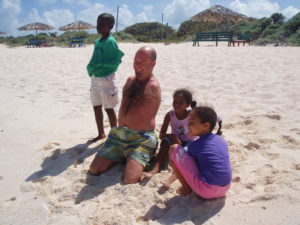
Who are the role models and influences in your life?
I can directly credit three people with my early inspirations for my life – my Mom and Dad and my band director, Blaine McClary.
My parents are obvious but if I may add something very deep for me. I was able to meet and get to know my birth family in 1993. I was able to see what my life might have been. I would have grown up on a very poor farm with no power, running water, or access to activities in town. I would have likely been resented by my siblings for being useless on the farm. Blaine McClary put a trombone on a wooden chair with metal rods and clamps that held it, like hands, so I could play in a band. Who does that? What kind of person thinks; “No arms…Trombone”! It altered my entire life path.
Because of my public life later on, I was fortunate to meet many people I consider to be my role models and mentors as well. For example, in the telethons I participated in, there were many prominent speakers who challenged me to up my game rather than patronize me because I had no arms.
Most importantly, in the last 30 years, my wife and business partner, Darlene, has literally changed me. The connection with her beliefs about living life with a purpose has brought us together in so many ways. It has allowed me to grow farther than I ever could have predicted. I am humbled every single day!
To you, what are the most important things in life?
For me it’s all about:
1) Gratitude; because we need to be thankful for what we have, not what we don’t.
2) Purpose; because everyone needs a reason to get out of bed every day.
3) Relationships; whether it’s a romantic partner, family friends, co-workers, or even pets, all of which can give us a unity of being. Be a “giver” not a “taker”; because that is the essence of balance.
4) Simplicity; the internet was supposed to make life easier and no question, it’s given our culture so much but it has led to device addiction, mental health issues for people who can’t “live without their phone”, the effects of cyberbullying and I won’t even mention Donald Trump and Twitter! We claim to “have no time” because we create a busy life that’s the opposite of ‘simple’.
5) Love; The world has enough hate. We need more love!
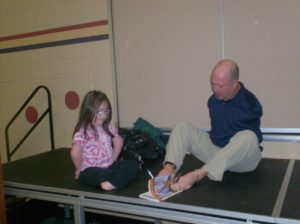
VIEWPOINTS
You mentioned in your bio that “how you look at life and make choices is a skill”. Could you elaborate on this?
Ultimately our perspectives of life is a learned behaviour that leads us to make decisions.
Consider this formula created by Jack Canfield in his best selling book, “Success Principles” – E +/- R = O To expand; “Event”, positive or negative “Response” equals “Outcome”!
If you learn this formula, practice it like a skill every day and it becomes a great habit that will make us experts at dealing with our circumstances, whatever they may be. This notion can seem naive but it really works and I have been practicing Canfield’s formula my whole life without even knowing it. I never read the book until later on!
What would be your advice to someone who is currently facing a crisis in his or her life?
In my bestselling book, “Alvin’s Laws of Life”, I have five laws – Attitude, Learn, Value, Imagination and Never Give Up. The “V” is this; “Value your life and spirit. Too many people live another ‘V’ in their lives and that is: ‘Victim’. It’s true. Bad things happen to good people and unfortunately there are sometimes victims. The trouble is, as a victim, there’s no answer to the question – “Why me?”
Even worse, victims often get stuck in their past, when what they need to do is live for today and look forward to the future. When you focus on moving forward, you never know what you’ll discover. Everyone has value. Finding it, that’s the trick”!
In what ways do you hope the world can change to accomodate to more people with some form of disability?
If the Covid-19 pandemic has taught us anything, it is that human beings are vulnerable. We are not statues that can withstand centuries of conflict. The price of being human is that we experience pain, loss, failure, rejection and so on. Clearly, our choices dictate our circumstances. If you choose a life of crime, be prepared to spend the rest of it in prison. But if you have proper moral code, ethics and values, you can live freely.
We are all up against something at some point in our lives, not just handicapped people. But with faith, belief, resilience and courage, I believe we can get through it all. Our reaction to our circumstances is a choice.
In 1977, I was very fortunate to be chosen to attend an International Red Cross Retreat at a camp in Norway. The King of Norway built it after his nephew became paralyzed in a skiing accident. It was the first completely “accessible” outdoor camp in the world. The experience was simply amazing and so welcoming even for people with disabilities. The next year, I went to Mount Royal College to study Broadcasting and it was also completely accessible for the handicapped.
We have come a long way to accommodate people with special needs. But we should continue to make every design of every new building as accessible as possible. This way, we all can truly feel equal in society.
To be really honest though, most people do not know what “accommodation, inclusion, diversity and equality’ means in practical terms. I often joke that the lack of consideration for handicap people is an evil conspiracy by human resource departments around the world to justify their existence. The point is, when we can learn these ideals aren’t about “special treatment” but to provide equality to everyone.
